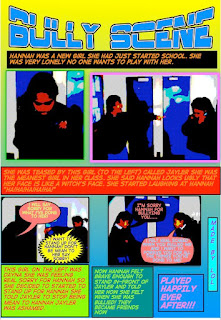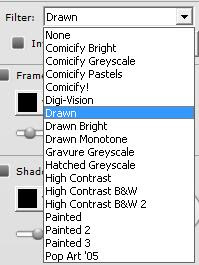All classes came into the lab and sat at the computers. To remind them of the sequence of the programme I had written a list on the Activboard
- Come in
- Sit down
- Log on
- Open Server
- Open Wikispaces page
- Click on Sign in
- Type in User name
- Open Pages
- Type six lines of Home Keys asdf jkl;
- Choose a game from the Wikipage to play
We revisited the Writing and Publishing Online Rules. Next we looked at the Xtranormal slideshow I had made, this was also a reminder of what they need to do. This is also an example of one of the types of publishing they are going to be doing this term.

For the rest of the session students worked on their Wordles and Copying/Pasting edited stories onto their wikipages.
 Some of the students have published wonderful Comic Life posters that have photos of children in them, but at the moment the school do not want to have the children’s photos online. So to publish them and protect anonymity we double click on each picture, click on the Details button
Some of the students have published wonderful Comic Life posters that have photos of children in them, but at the moment the school do not want to have the children’s photos online. So to publish them and protect anonymity we double click on each picture, click on the Details button and used one of the Filters to comicfy the pictures.
and used one of the Filters to comicfy the pictures.  .
.Do this for each photo and the effect is that that you can still make out what the figures are doing, but you can't make out the faces.
One major teaching point this session was showing students how they could have multiple pages open on their browser.
I noticed that when they needed to go to a new website they would type over the address of the page they were on.
I demonstrated how they could press Command-T (Control-T) to open up a new page where they could type the address.
I also needed to remind them that they do not need to type the whole address, (miss out the http://www).
Routines have been set now, students now know how to respond when I need their attention 'Stop, look, listen' and they have already learned many new skills.
Next week the teachers would like their students to publish some writing they have finished. The week after that I will be starting Argument writing.







